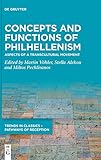Concepts and Functions of Philhellenism : Aspects of a Transcultural Movement / ed. by Martin Vöhler, Stella Alekou, Miltos Pechlivanos.
Material type: TextSeries: Trends in Classics – Pathways of Reception ; 7Publisher: Berlin ; Boston : De Gruyter, [2021]Copyright date: ©2021Description: 1 online resource (VII, 292 p.)Content type:
TextSeries: Trends in Classics – Pathways of Reception ; 7Publisher: Berlin ; Boston : De Gruyter, [2021]Copyright date: ©2021Description: 1 online resource (VII, 292 p.)Content type: - 9783110715712
- 9783110716092
- 9783110716023
- 940
- online - DeGruyter
- Issued also in print.
| Item type | Current library | Call number | URL | Status | Notes | Barcode | |
|---|---|---|---|---|---|---|---|
 eBook
eBook
|
Biblioteca "Angelicum" Pont. Univ. S.Tommaso d'Aquino Nuvola online | online - DeGruyter (Browse shelf(Opens below)) | Online access | Not for loan (Accesso limitato) | Accesso per gli utenti autorizzati / Access for authorized users | (dgr)9783110716023 |
Frontmatter -- Contents -- Acknowledgements -- Concepts and Functions of Philhellenism: Aspects of a Transcultural Movement -- Part I: Ancient Philhellenism -- Shaping the (Hi)story of Innovation: Livius Andronicus as the First Poet of Latin Literature -- Ηellenism in Horace’s Literary Criticism -- ‘Inappropriate’ Philhellenism in Roman Satire -- Philhellenism, Patronage and Poetics in Martial -- Enthusiasm and Mimesis in Longinus’ Concept of the Sublime -- Part II: Philhellenism and the Greek Revolution -- Hellenism and Philhellenism in British Experience -- Could Leo Become Leonidas Again? The German Philhellene Wilhelm Müller and his Ambivalent Reception of Lord Byron -- Philhellenism as an Exploration of Identity and Alterity in the Literary Tradition of Travels to the East in the 19th century -- Adamantios Korais (Smyrna 1748–Paris 1833), philhellène à sa manière -- Europeans in the Greek Landscape: Idealization, Appropriation, Disillusionment -- Philhellenism and Constitutionalism: The First Greek Constitutions -- Part III: Philhellenism and European Identity -- Building Europe from Below: The Philhellenic Committee Movement as an Early Form of European Integration -- Philhellenism and Geopolitics: Friedrich Thiersch’s De l’état actuel de la Grèce (1833) as a European Project -- The Greek ‘Great Idea’ of Irredentism Up Against a Defunct Philhellenism (1850–1880) -- Conclusions and Prospects -- Ancient Greece and the Identity of Modern Europe -- List of Contributors -- Index of Names
restricted access online access with authorization star
http://purl.org/coar/access_right/c_16ec
Key aspects of philhellenism – political self-determination, freedom, beauty, individual greatness – originate in antiquity and present a complex reception history. The force of European philhellenism derives from ancient Roman idealizations, which have been drawn on by European movements since the Enlightenment. How is philhellenism able to transcend national, cultural and epochal limits? The articles collected in this volume deal with (1) the ancient conceptualization of philhellenism, (2) the actualization and politicization of the term at the time of the European Restoration (1815–30), and (3) the transformation of philhellenism into a pan-European movement. During the Greek struggle for independence the different receptions of philhellenism regain a common focus; philhellenism becomes an inextricable element in the creation of a pan-European identity and a starting point for the regeneration and modernization of Greece. – It is easy to criticize the tradition of philhellenism as being simplistic, naïve, and self-serving, but there is an irreducibly utopian element in later philhellenic idealizations of ancient Greece.
Issued also in print.
Mode of access: Internet via World Wide Web.
In English.
Description based on online resource; title from PDF title page (publisher's Web site, viewed 28. Feb 2023)


